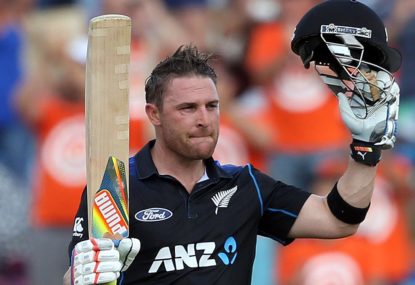It may have been a great finish, but Australia have a lot to think about, even if their Eden Park embarrassment was partly disguised by some bowling magic from Mitchell Starc.
Don’t think I’m being a curmudgeon – it was an excellent game to watch, and 150 versus 150 makes for much more compelling viewing than 400 versus abject surrender. But from an Australian team perspective the game was still a disaster.
In the incongruous surrounds of a rugby ground packed with 60,000 hostile New Zealanders, pre-game conversation of massive scores and short boundaries collapsed as quickly as Australia’s batting, the visitors shot out for their lowest first-innings World Cup score of 151.
Tim Southee removed the openers, Daniel Vettori choked up numbers three and four, then Trent Boult cleaned up most of the rest with a return of 5/27. But it wasn’t the unplayable bowling that Southee produced to demolish England earlier in the tournament. The Australians have plenty of reason to look at their own approach.
Aaron Finch was bowled missing a shot that wasn’t there. Shane Watson holed out to midwicket. Glenn Maxwell and Mitchell Marsh chopped on, Michael Clarke and Mitchell Johnson chipped to cover, Mitchell Starc played around a straight one.
Only David Warner and Steve Smith could claim little fault in their dismissals, while Brad Haddin had licence to slog in a last-wicket stand that dragged Australia’s total up from the depths of 106/9.
The collapse was about going too hard too soon, then losing composure when things came undone. Enough talk about short boundaries will see batsmen try to find them, but as cooler heads advised during the lead-up, Eden Park has no history of huge scores.
In 69 matches at the ground, only five innings have topped 300 runs. More important is what happens with the pitch and with the ball, and Saturday’s game offered swing and bounce in plenty.
It was a disastrous return to the side for Michael Clarke, both as a batsman and a captain. I’ve argued previously that it’s hard to make a case for Clarke being in Australia’s best one-day XI. I won’t go over all that again.
But it’s still significant that he’s there by dint of his ambition to captain a World Cup win. I admire and respect Clarke’s achievements, but here preoccupation with his personal legacy has overridden the team’s interest.
He may yet do well in this tournament, and I hope he does, but it won’t legitimise the reason for his presence.
George Bailey, the man Clarke replaced, may not have offered anything more in Saturday’s shambles, but we’ll never know: showing a cool head to rescue the team has been one of Bailey’s specialties.
Clarke’s dismissal today was all rust and no steel: the drive caught at cover must be the softest and most basic cricketing error.
He was rusty in the field too, and the scorecard flatters him.
With Starc swinging the ball and rattling the stumps, having just taken two wickets for four runs across three overs that included the innings dinner break, with Corey Anderson looking extremely shaky, and with 60 runs still required to win, Clarke replaced the bowler with Johnson.
Johnson’s first spell of four overs had gone for 52. Anderson duly collared him for 16.
Clarke then brought on mid-innings filler in Marsh. When Starc finally returned he immediately resumed taking wickets, but New Zealand were within 15 of their target.
In Australia’s innings, McCullum adapted and kept bowling those who were causing the damage. Clarke remained on auto-pilot.
The only upside for Australia is the confidence boost for a quiet bowler who needs to believe in his own ferocity. Although New Zealand’s batsmen attacked throughout, Starc’s ability to land fast swinging yorkers under pressure – three of his wickets were clean bowled – will be important in the games to come.
Australia’s position in the group is not guaranteed. Games against Scotland, Afghanistan and Sri Lanka remain, but one stumble or washout could see the co-host nation finish third, looking at a semi-final rematch back at Eden Park.
Cricket Australia have not deemed New Zealand worthy of a single match since the last World Cup, and even in next season’s schedule have preferred the comatose West Indies for the marquee Boxing Day Test.
The Chappell-Hadlee trophy, which should be contested over a series, was thrown to the winner of Saturday’s game like an extra tyre with a car sale.
Add the selection of a captain who had barely played the format since 2013, and there’s still a chance Australia will be left to rue both counts of complacency.
This article was first published on Wisden India.





























































































